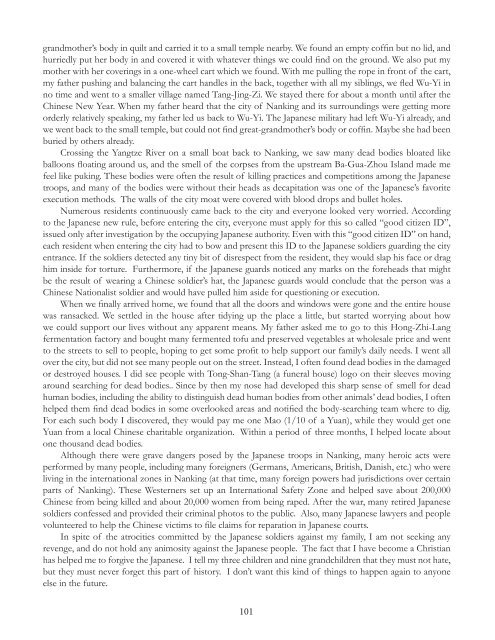Download - Canada ALPHA
Download - Canada ALPHA
Download - Canada ALPHA
Create successful ePaper yourself
Turn your PDF publications into a flip-book with our unique Google optimized e-Paper software.
grandmother’s body in quilt and carried it to a small temple nearby. We found an empty coffi n but no lid, and<br />
hurriedly put her body in and covered it with whatever things we could fi nd on the ground. We also put my<br />
mother with her coverings in a one-wheel cart which we found. With me pulling the rope in front of the cart,<br />
my father pushing and balancing the cart handles in the back, together with all my siblings, we fl ed Wu-Yi in<br />
no time and went to a smaller village named Tang-Jing-Zi. We stayed there for about a month until after the<br />
Chinese New Year. When my father heard that the city of Nanking and its surroundings were getting more<br />
orderly relatively speaking, my father led us back to Wu-Yi. The Japanese military had left Wu-Yi already, and<br />
we went back to the small temple, but could not fi nd great-grandmother’s body or coffi n. Maybe she had been<br />
buried by others already.<br />
Crossing the Yangtze River on a small boat back to Nanking, we saw many dead bodies bloated like<br />
balloons fl oating around us, and the smell of the corpses from the upstream Ba-Gua-Zhou Island made me<br />
feel like puking. These bodies were often the result of killing practices and competitions among the Japanese<br />
troops, and many of the bodies were without their heads as decapitation was one of the Japanese’s favorite<br />
execution methods. The walls of the city moat were covered with blood drops and bullet holes.<br />
Numerous residents continuously came back to the city and everyone looked very worried. According<br />
to the Japanese new rule, before entering the city, everyone must apply for this so called “good citizen ID”,<br />
issued only after investigation by the occupying Japanese authority. Even with this “good citizen ID” on hand,<br />
each resident when entering the city had to bow and present this ID to the Japanese soldiers guarding the city<br />
entrance. If the soldiers detected any tiny bit of disrespect from the resident, they would slap his face or drag<br />
him inside for torture. Furthermore, if the Japanese guards noticed any marks on the foreheads that might<br />
be the result of wearing a Chinese soldier’s hat, the Japanese guards would conclude that the person was a<br />
Chinese Nationalist soldier and would have pulled him aside for questioning or execution.<br />
When we fi nally arrived home, we found that all the doors and windows were gone and the entire house<br />
was ransacked. We settled in the house after tidying up the place a little, but started worrying about how<br />
we could support our lives without any apparent means. My father asked me to go to this Hong-Zhi-Lang<br />
fermentation factory and bought many fermented tofu and preserved vegetables at wholesale price and went<br />
to the streets to sell to people, hoping to get some profi t to help support our family’s daily needs. I went all<br />
over the city, but did not see many people out on the street. Instead, I often found dead bodies in the damaged<br />
or destroyed houses. I did see people with Tong-Shan-Tang (a funeral house) logo on their sleeves moving<br />
around searching for dead bodies.. Since by then my nose had developed this sharp sense of smell for dead<br />
human bodies, including the ability to distinguish dead human bodies from other animals’ dead bodies, I often<br />
helped them fi nd dead bodies in some overlooked areas and notifi ed the body-searching team where to dig.<br />
For each such body I discovered, they would pay me one Mao (1/10 of a Yuan), while they would get one<br />
Yuan from a local Chinese charitable organization. Within a period of three months, I helped locate about<br />
one thousand dead bodies.<br />
Although there were grave dangers posed by the Japanese troops in Nanking, many heroic acts were<br />
performed by many people, including many foreigners (Germans, Americans, British, Danish, etc.) who were<br />
living in the international zones in Nanking (at that time, many foreign powers had jurisdictions over certain<br />
parts of Nanking). These Westerners set up an International Safety Zone and helped save about 200,000<br />
Chinese from being killed and about 20,000 women from being raped. After the war, many retired Japanese<br />
soldiers confessed and provided their criminal photos to the public. Also, many Japanese lawyers and people<br />
volunteered to help the Chinese victims to fi le claims for reparation in Japanese courts.<br />
In spite of the atrocities committed by the Japanese soldiers against my family, I am not seeking any<br />
revenge, and do not hold any animosity against the Japanese people. The fact that I have become a Christian<br />
has helped me to forgive the Japanese. I tell my three children and nine grandchildren that they must not hate,<br />
but they must never forget this part of history. I don’t want this kind of things to happen again to anyone<br />
else in the future.<br />
101


